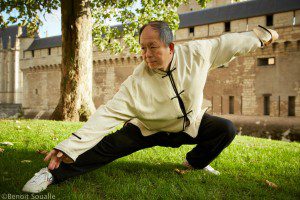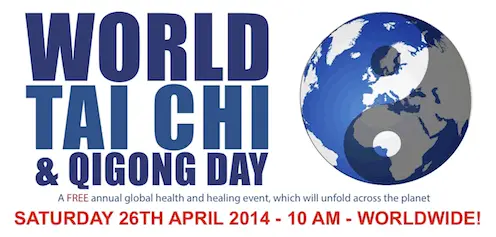Contributing Writer for Wake Up World
Tai Chi Chuan or any Tai Chi is at some depth a Kung Fu. It’s a martial art, but it’s more than that. It’s a healing art, a meditation that helps one’s balance and fires off the brain in such a quality way that there is a near immediate dendrite high if you will – a tangible mind/body/spirit connection, as well as a true connection with one’s surroundings. It can do wonders for the ailed as well as athletes of all types, healing wounds and honing physical skills. It’s also a folk dance of sorts, and the only way I can fake an ability to dance is by repeating Tai Chi movements.
There is not one superior type of posturing, just as there is not a superior form of Tai Chi. There are only more dedicated practitioners.
But Tai Chi is much more than a physical art that cultivates one’s energy and betters one’s well-being and sense of connection. It is a metaphysical art. If Tai Chi was just a healing/martial art there would be no enhanced intuition as a result of its practice, and the movements would not lead to metaphysical discussion among practitioners.
[pro_ad_display_adzone id=”110028″]
Tai Chi is all about developing grounding and rooting, as are so many meditations themselves. But since Tai Chi is done standing and walking – as opposed to Yoga that is primarily standing, sitting and lying postures – the meditativeness achieved through Tai Chi movement is more applicable and more transferable to the rest of our day, as we walk and stand around others.
In fact Tai Chi Chuan and Yoga are not only intimately related, but sourced from the same vein. The more I look into the relationships between Hinduism and Buddhism, the more apparent the relationship between Yoga and Tai Chi becomes.
This relationship is displayed in legends about Tibetan yogi Milarepa, and further developments into Chinese ideas as displayed in written works like The Secret of the Golden Flower that combined Buddhism and Daoism. Bodhidharmma, the father of Zen Buddhism, was from India and brought meditative movements to the Shaolin Temple in China. And we can trace practically all martial and internal arts back to or back through India.
Tai Chi, Qigong (Chi Gung), Yoga, or whatever… it’s all mutual.
Types of Tai Chi
There are four main forms of Tai Chi – Chen, Sun, Yang and Wu – and there are many different styles within each form. No matter how different they are, each contain some of the same practices and entirely the same theories as the other. The interesting thing about Tai Chi (as opposed to practically everything in the post-modern world) is that, as long as you keep in mind certain concepts, you can’t do it wrong – you can only refine it. In this way there is constant potential to learn more from the same movement.
In Tai Chi, some movements are just variations of warrior poses, only done with a less deep stretch. And in the form I practice, there are a couple of movements that involve, or potentially involve, brushing oneself, tapping certain body parts and even a moderate stomp. I say ‘potentially’ because in Tai Chi there is infinite variation; change is good, being flexible and accepting of new ways to do things and new forms to practice is a big lesson. It’s said that in the long form, there is a variation of every movement possible and a reflection of every martial, healing and internal art.
Bone Tapping – a Healing Art
One of the simplest healing arts, a primal uncle of Tai Chi as I was taught, is called bone tapping. Bone tapping is about healing yourself using your own touch. The basic premise is that this practice sends vibrations father and deeper into the body, and the vibration eliminates tension and inflammation which lead to all sorts of distress and disease, allowing the body to self-correct according to its natural intelligence.
Grounding is so important as it keeps us connected to the source energy of our Earth mother. And because so few people do actually ground, I believe the bone tapping procedure is both an important grounding and healing tool.
It involves using any part of your hands and fists to hit yourself. Begin with your calves and shins, the harder the better, but keep it reasonable. You can exhale out the taps throughout the series, and particularly as you begin tapping the abdomen. Breathe out the tension, do not tense up. Hit the sides of the calves, the backs and even knock on the shins and/or rub them downward. Hitting the back of the knees is said to stop varicose vein formation. Even though it’s called bone tapping, one primarily taps next to the bones. Continue up, including the thighs and legs all over. Proceed to the coccyx and the lower back, then the front equivalent and continue upwards tapping chest, back, shoulders, arms, neck, chin and head (as hard as it can take) all the way to the crown of our head. Then – and this is considered a moderate secret – end by tapping the softest bones of our body, the clavicles or collar bones.
 World Tai Chi Day – 26th April 2014
World Tai Chi Day – 26th April 2014
World Tai Chi and Qigong Day is an annual global health and healing event. On 26th of April, the 16th annual Tai Chi Day, let’s take this philosophy to the world. Since all meditative movement originates from the same place, let’s all come together – as one – in a meditation for peace and unity of humanity.
If every meditator, every Yoga, Tai Chi and Qigong practitioner all perform their art out in the open for all to see, maybe we can raise awareness of our healing, meditative and intuitive movements. This is an opportunity to share an idea or healing movement with someone – like I’ve just done today – that might help them! In this way we can change things, starting from a metaphysical basis.
So on 26th April, bust out your form, rock some sun salutations, or meditate in a place you normally would not…. and see what happens!
From the World T’ai Chi & Qigong Day website:
Beginning in New Zealand, this event will spread time zone by time zone across the globe, through 60 countries and across 6 continents. This healing wave will be a spectacular visual sight which will promote calm and wellness worldwide. Mass Tai Chi and Qigong (Chi Gung) exhibitions will be held in public places to educate the world about the benefits of the Traditional Chinese Medicine exercises of Tai Chi and Qigong (Chi Gung).
Tai Chi and Qigong are health technologies evolved over thousands of years of research in China, and are now growing in popularity worldwide. They are used in hospitals, businesses, prisons, schools and other institutions. They have been shown in research to reduce anxiety, depression and chronic pain conditions. They boost the immune system, improve respiratory function, burn calories, dramatically improve balance, provide cardiovascular benefit, provide powerful stress management tools, slow aspects of the aging process and lift spirits.
In all, Tai Chi and Qigong promote the feel good factor.
A Final Thought – Zero Gravity Tai Chi
My teacher and I talk about a lot of things, and we both recently shared an intuitive idea that had crossed both our minds for the very first time that very day. Our intuitively grasped (some would say ‘imagined’) idea relates to the healing art of Tai Chi and bone tapping. We had previously, long story short, contemplated whether you could do Tai Chi in zero gravity because you could never be grounded through your feet. At the very least, it would be entirely different form of Tai Chi. And then the conversation shifted. The next time we spoke, we both had taken an intuitive step forward in contemplating zero gravity.
One of the main problems for people in space is dealing with the ill effects of zero gravity. Muscle and bone density decreases drastically, and it seems that astronauts and cosmonauts alike have not found a way to deter this loss of bone and muscle density in zero gravity conditions.
The Russian martial art of Systema has some bone tapping ideas in it; it focuses mainly on controlling the six body levers (elbows, neck, knees, waist, ankles, and shoulders) through pressure point application and striking. As it is more in a martial than healing tradition, perhaps some cosmonauts have tried it. If not, we believe they should as bone tapping may deter bone density loss in space, just as it does on Earth.
While I strongly believe we should take care of Gaia rather than go playing in space, I do hope this helps someone, somewhere.
Editor’s note:
For more information on meditative practices and movements that can help you access and balance your energy, check out Ethan’s book Tibetan Fusion, available now on Amazon.
For more information on World Tai Chi & Qigong Day, please visit worldtaichiday.org or visit the WTCD Facebook page.
Previous articles by Ethan:
- Meditation and Intuition in the Fourth Age of Deception (the Kali Yuga)
- We Have Sustainable Energy Technology – the Problem is the Oligarchy
- Why Governments Promote Deadly Nuclear Energy and Ban Beneficial Hemp
- The 5 Tibetan Rites of Rejuvenation: 108 Movements to a Meditative Mind State
- How to Enhance Intuition: Understanding the Four Forms of Awareness
- A Little Green Revolution: the Rainbow Warriors will Heal the Earth Mother
- Hate: The Ultimate Social Control Mechanism
- The Great Unsaid: What 1984 Can Teach Us About 2014
- Oligarchical Collectivism and the Four Steps to Learning Politics
About the author:
 Author Ethan Indigo Smith was born on a farm in Maine and lived in Manhattan for a number of years before migrating west to Mendocino, California.
Author Ethan Indigo Smith was born on a farm in Maine and lived in Manhattan for a number of years before migrating west to Mendocino, California.
The events of September 11, 2001 inspired him to write his first book, The Complete Patriot’s Guide to Oligarchical Collectivism, an insightful exploration of history, philosophy and contemporary politics.
A unique blend of philosophy, politics, activism, spirituality, meditation and humour, Ethan’s more recent publications include:
- Tibetan Fusion a book of simple meditative practices and movements that can help you access and balance your energy,
- The Little Green Book of Revolution an inspirational book based on ideas of peaceful revolution, historical activism and caring for the Earth like Native Americans,
- The Matrix of Four, The Philosophy of the Duality of Polarity on the subject of the development of individual consciousness, and
- the controversial The Terraist Letters, a work that humorously contrasts the very serious issues of global nuclear experimentation promotion and global marijuana prohibition.
Visit Ethan on Facebook and check out Ethan’s author page on Amazon.
[pro_ad_display_adzone id=”110027″]








